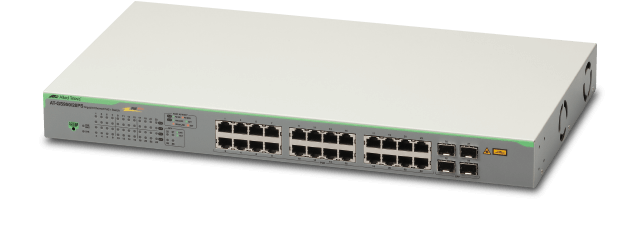Performance
- 40 Gbps of stacking bandwidth
- 9KB L2 jumbo frames
- Wirespeed multicasting
- Up to 16K MAC addresses
- 512MB DDR SDRAM
- 64MB flash memory
Power characteristics
- AT-GS924MX and AT-GS948MX
- AC model: 100-240 VAC, 1.0A maximum, 50/60 Hz
- AT-GS924MPX and AT-GS948MPX
- AC model: 100-240 VAC, 5.0A maximum, 50/60 Hz
Expandability
- Hardware Virtual Chassis Stacking (VCStack™) up to four units
Flexibility and Compatibility
- Port speed and duplex configuration can be set manually or by auto-negotiation diagnostic tools
- Automatic link flap detection and port shutdown
- Optical Digital Diagnostics Monitoring (DDM)
- Ping polling and TraceRoute for IPv4 and IPv6 Port mirroring
IP Features
- IPv4 static routing and RIP
- Device management over IPv6 networks with SNMPv6, Telnetv6 and SSHv6
- NTPv6 client
- IPv6 Ready certified
Management
- Front panel 7-segment LED provides at-a-glance status and fault information
- Allied Telesis Autonomous Management Framework (AMF) enables powerful centralized management and zero-touch device installation and recovery
- AMF secure mode increases network security with management traffic encryption, authorization, and monitoring
- Console management port on the front panel for ease of access
- Eco-friendly mode allows ports and LEDs to be disabled to save power
- Industry-standard CLI with context-sensitive help
- Powerful CLI scripting engine
- Comprehensive SNMP MIB support for standards-based device management
- Built-in text editor
- Event-based triggers allow user-defined scripts to be executed upon selected system events
- USB interface allows software release files, configurations and other files to be stored for backup and distribution to other devices
Quality of Service
- Eight priority queues with a hierarchy of high-priority queues for real-time traffic, and mixed scheduling, for each switch port
- Limit bandwidth per port or per traffic class down to 64kbps
- Wirespeed traffic classification with low latency essential for VoIP and real-time streaming media applications
- Policy-based QoS on VLAN, port, MAC and general packet classifiers
- Policy-based storm protection
- Extensive remarking capabilities
- Taildrop for queue congestion control
- Strict priority, weighted round robin or mixed scheduling
- IP precedence and DiffServ marking based on layer 2, 3 and 4









